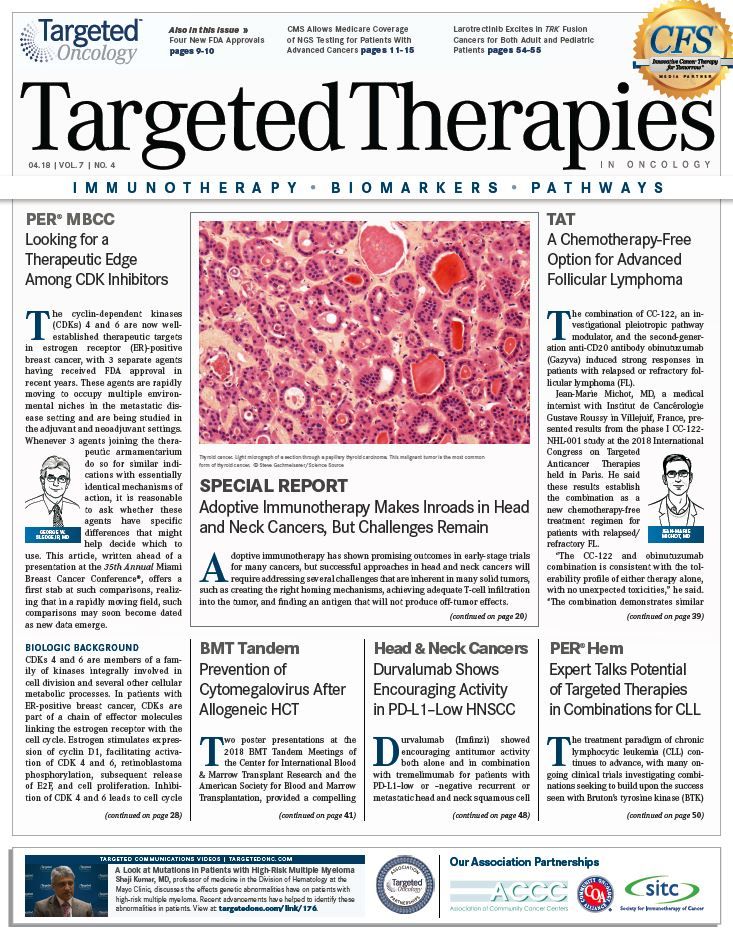The Right Drug for the Right Patient: Moving Closer to Truly Personalized Medicine
Arjun V. Balar, MD, joins <em>Targeted Therapies in Oncology™</em> to cover the latest developments in cancer therapies that will span new and emerging agents and classes including targeted therapies, immunotherapies, biologics, and cytotoxics, as well as continue to focus on efforts to improve patient selection using biomarkers.
Arjun V. Balar, MD
It is truly an exciting time in cancer research and drug development and it’s a privilege to be able to joinTargeted Therapies in Oncology™and assist an outstanding team of editors and writers to disseminate the most up-to-date, timely and clinically relevant information in this fast-paced era. Our aim is to cover the latest developments in cancer therapies that will span new and emerging agents and classes including targeted therapies, immunotherapies, biologics, and cytotoxics, as well as continue to focus on efforts to improve patient selection using biomarkers.
In cancer research, beyond identifying and developing the next agent to target a key pathway in cancer, equally important will be improving upon the ability to reliably identify biomarkers to make sure that oncologists provide the right drug for the right patient, including the rare patient with a unique set of cancer genetics. There have been outstanding examples of this in the last year, beginning with the approval of pembrolizumab (Keytruda), an antiPD-1 antibody, in May 2017 for the treatment of patients with microsatellite instability-high cancers, regardless of the tumor type. This was the first ever tumor-agnostic approval for an agent, with treatment selection based on a genomic biomarker, rather than on cancer type.
An equally successful, and in some respects even more remarkable, example has to be the recently reported phase I/II multicohort study of larotrectinib in adults and children with cancers harboring activating fusions in tropomyosin receptor kinase (TRK).1Larotrectinib, an orally administered selective inhibitor of TRK, demonstrated a centrally confirmed 75% objective response rate, with 71% of responses ongoing at 1 year with excellent safety. In fact, no patients discontinued treatment due to toxicity. Most striking, however, was that 17 different tumor types were represented in this study, highlighting that although the overall prevalence ofTRKfusions is quite rare, estimated at 1% of all solid tumors, a tumor-agnostic approach in drug development can still demonstrate clinically meaningful outcomes that can impact patient care.
Loxo Oncology, which manufactures larotrectinib in partnership with Bayer, initiated submission of a rolling new drug application (NDA) to the FDA for larotrectinib for the treatment of unresectable or metastatic solid tumors with neurotrophicTRK-fusion proteins in adult and pediatric patients who require systemic therapy and who have either progressed following prior treatment or who have no acceptable alternative treatments. The NDA submission was completed in March 2018.2
Among the many challenges that lay ahead for biomarker-driven therapeutics is the potential for escalating costsnot only related to drug prices, but also to the wider implementation of molecular profiling as a standard of care in all patients with cancer. Hopefully, as patient selection is improved upon (remember, the right drug for the right patient), patients may derive cost savings with improved outcomes, fewer complications, and overall better end-of-life care by avoiding the administration of treatments that are destined to be ineffective. The challenges and successes are all part of our continual striving to improve the outcomes for patients afflicted with cancer.
References:
- Drilon A, Laetsch TW, Kummar S, et al. Efficacy of larotrectinib in TRK fusion-positive cancers in adults and children.N Engl J Med.2018;378(8):731-739. doi: 10.1056/NEJMoa1714448.
- Loxo Oncology completes rolling submission of new drug application to U.S. food and drug administration for larotrectinib for the treatment of TRK fusion cancer. Stamford, CT: Loxo Oncology; March 26, 2018. ir.loxooncology.com/ press-releases/loxo-oncology-initiates-rolling-submission-of-new-drug-application-to-u.s.-food-and-drug-administration- for-larotrectinib-for-the-treatment-of-trk-fusion-cancers. Accessed March 28, 2018.

Survivorship Care Promotes Evidence-Based Approaches for Quality of Life and Beyond
March 21st 2025Frank J. Penedo, PhD, explains the challenges of survivorship care for patients with cancer and how he implements programs to support patients’ emotional, physical, and practical needs.
Read More